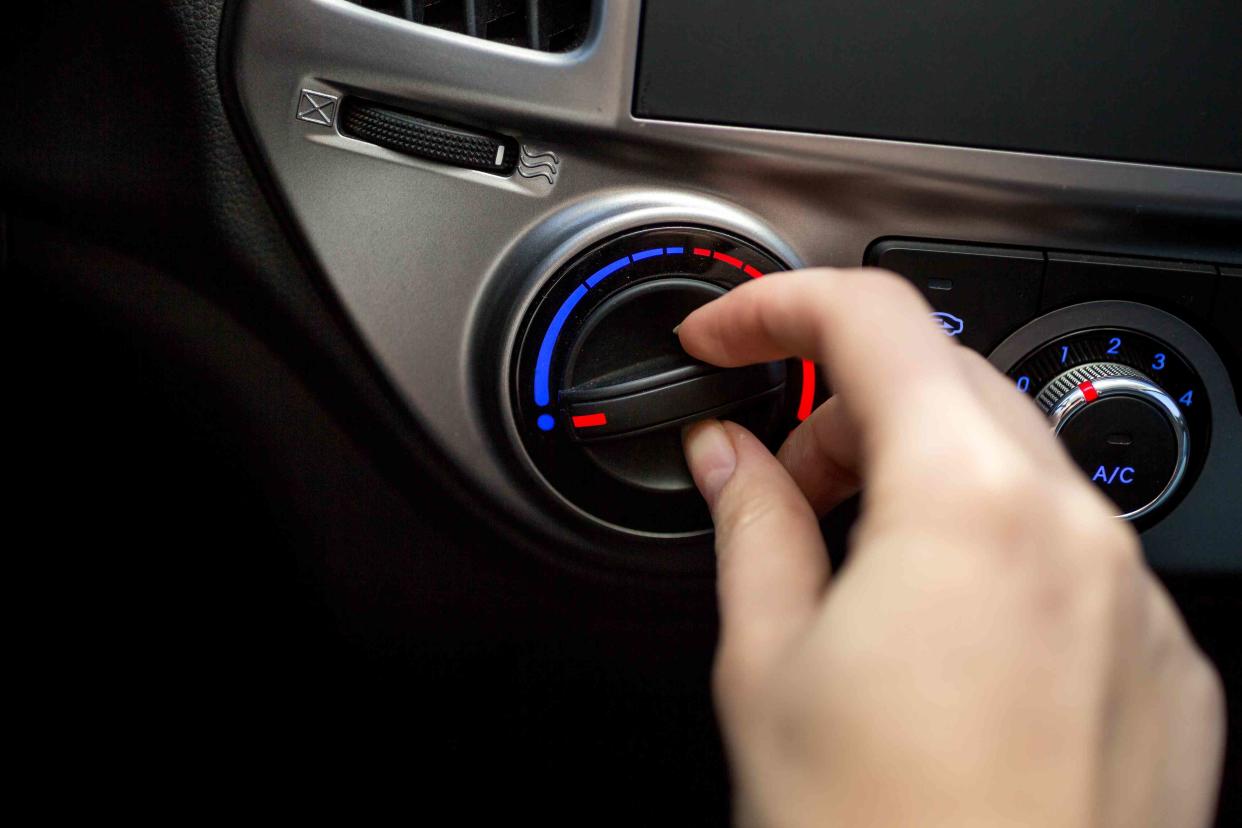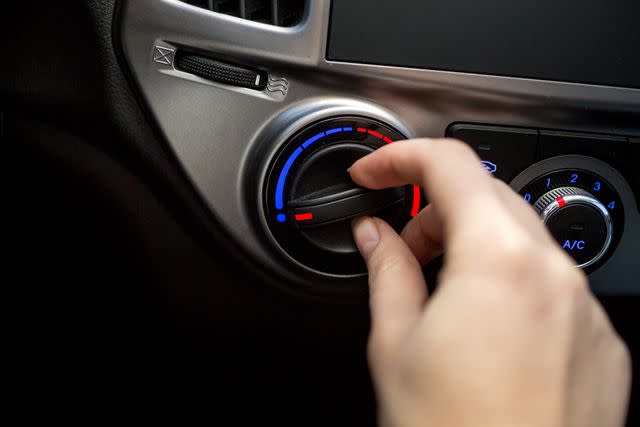Hot Flashes

Artfoliophoto / Getty Images
Medically reviewed by Renita White, MD
Hot flashes are brief periods when a person suddenly feels warm and develops sweating and flushing usually of the face, neck, and chest. They typically last about one to five minutes and are most common in menopause. About 75% of menopausal people will experience hot flashes.
Hot flashes usually are treated and controlled with lifestyle changes. However, some people with severe symptoms will need hormone therapy to control their hot flashes. Luckily, menopausal hot flashes last for less than two years for most people.
This article discusses the causes of hot flashes and how to treat them.

Artfoliophoto / Getty Images
Symptoms of Hot Flashes
Many people experience hot flashes in addition to other symptoms of menopause. The primary sign of hot flashes is increased skin temperature, particularly around the face, neck, and chest. You may also experience:
Flushing or red tint to the skin, similar to blushing
Sweating
Feeling very warm
Racing heart or heart palpitations
Dizziness
The symptoms of hot flashes usually come on suddenly and resolve quickly. Hot flashes generally don’t last for more than five minutes. Still, their impact can be significant, and many people report sleep loss due to hot flashes that happen at night, known as night sweats.
Causes of Hot Flashes
Common causes of hot flashes are:
After giving birth (postpartum)
Emotions or anxiety
Food or drink
Medications
Menopause
Hot flashes happen when the body responds to a slight elevation in core temperature. During menopause, levels of the hormone estrogen drop significantly. Researchers believe that this drop causes the body to become more sensitive to even small temperature regulations.
Postpartum Hot Flashes
Hot flashes can occur after a person gives birth, particularly if breastfeeding. Breastfeeding blocks estrogen production, putting a person into a state similar to menopause. That’s why breastfeeding people can experience such symptoms as hot flashes and vaginal dryness.
Emotions or Anxiety
Heightened states of emotion, nervousness, and anxiety can cause you to feel hot and flushed. You may also experience sweating or a racing heart.
Food and Drink
Certain foods and drinks can cause a hot flash, including:
Spicy foods
Drinks with caffeine
Alcohol
Processed meats like lunch meats or hot dogs
What Medications Can Cause Hot Flashes?
Some medications list hot flashes as a side effect, including:
Antidepressants (medication for depression and other mental health disorders)
Opioids (strong medications used for pain relief)
Steroids (medicine to treat asthma, arthritis, and other forms of inflammation)
Osteoporosis medications (used to treat and prevent brittle bones)
Calcium channel blockers (used to treat high blood pressure, angina, and irregular heartbeats)
Vasodilators (medication to treat high blood pressure)
Related: What Causes Hot Flashes Other Than Menopause?
How to Treat Hot Flashes
Hot flashes can be treated through lifestyle changes, hormone therapy, and other medications. Most people should try lifestyle changes first, but if your symptoms interfere with your quality of life or interrupt your sleep, you should talk with your healthcare provider about what medications may help you.
Lifestyle Adjustments
Lifestyle changes for hot flashes focus on reducing your temperature once they begin. They include:
Drink a cool glass of water or juice when you feel the hot flash.
Apply a cold compress or ice pack to your chest or face during the hot flash. If you experience night sweats, you may want to keep a cold compress near your bed.
Dress in layers so you can remove clothing when the hot flash begins.
There are also steps you can take to prevent hot flashes by regulating your temperature throughout the day, including:
Control stress, which may increase hot flashes.
Avoid spicy foods, alcohol, caffeine, hot tea, and other food or drink that triggers hot flashes.
Eat at regular intervals and avoid large meals.
Wear breathable fabrics like cotton, and use breathable material on your bed.
Keep a diary of hot flash triggers to better understand what brings them on for you.
Hormone Therapy
Hormone therapy is a medical treatment that replaces the estrogen lost during menopause. This helps alleviate menopause symptoms, including hot flashes.
In the past, hormone therapy was considered unsafe and linked with health risks. As of 2017, the North American Menopause Society has claimed that the benefits may outweigh the risk for many people, especially those who begin therapy before they are 60.
Deciding whether to pursue hormone therapy is an individualized decision. If you’re interested, you should talk with your healthcare provider about the benefits and risks of this kind of treatment.
Other Medications
Selective serotonin reuptake inhibitors (SSRIs), a class of antidepressants, may help treat hot flashes. Some types of these medications include:
Other non-hormonal medications that may help with hot flashes include clonidine, Neurontin (gabapentin), and Veozah (fezolinetant) may help with hot flashes. Talk with a healthcare provider about whether these are right for you.
Are There Tests to Diagnose the Cause of Hot Flashes?
If you are a person who menstruates, a healthcare provider may diagnose perimenopause (the period before menopause) or menopause based on your age and report of menstrual periods. Blood levels of estradiol and follicle-stimulating hormone (FSH) may be done to support a diagnosis of menopause.
In some cases, a healthcare provider may look for less common underlying conditions that could produce hot flashes or night sweats. They may do blood tests and imaging to look for conditions such as tumors or hyperthyroidism (a high level of thyroid hormone).
When to See a Healthcare Provider
If you are experiencing repeated hot flash or night sweat episodes that are not likely due to perimenopause or menopause, see a healthcare provider.
If your hot flash episodes are expected due to your menstrual history, see a healthcare provider if they are severe or are impacting your sleep and other aspects of life.
Summary
Hot flashes are extremely common, affecting about three-quarters of people in menopause. They’re mostly harmless but can interrupt your day-to-day activities and impact sleep. Lifestyle changes can help control hot flashes, as can medications.
Frequently Asked Questions
How do you get rid of hot flashes fast?
Drinking cold water or juice at the onset of a hot flash, using a cold compress, and removing layers of clothing are some ways to help get rid of hot flashes quickly. Remember, most hot flashes last for less than five minutes.
Which vitamins help with hot flashes?
Some research indicates that vitamin B9 (folate) may reduce hot flashes. Women have reported success in reducing hot flashes using herbs like black cohosh, but the benefits have not been scientifically proven.
What can trigger hot flashes?
Stress, emotions, and anxiety can trigger hot flashes. So can hot drinks, alcohol, caffeine, and spicy foods. Keeping a diary of when your hot flashes occur helps you avoid triggers.

